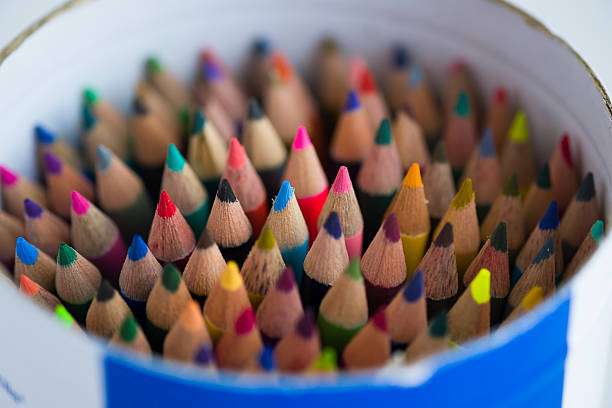
Saws that spin at 8,000 revolutions a minute produce a loud whine. As they fly through the paint box, pencils clack and clack. Then comes the ratcheting noise as aluminum ferrules, erasers, and other parts are punched on. A blast of air is used to clear the crevices in the machinery so that the conveyor belts move smoothly and continuously.
Near the end of an assembly line, in a corner where logos are imprinted on pencils, there is only the soft clink as the little sticks fall into a pile. Scott Johnson takes a pencil from a bin and examines the foil name that has just been stamped.
It is the same at Musgrave Pencil Company. There are only four pencil makers left in America, as opposed to the two dozen that used to exist. Shelbyville, Tennessee (about 60 miles southeast of Nashville) has the seal “The Pencil City.”
James Radford Musgrave founded a mill for pencil wood in the area in 1916. The area was a magnet for mills because of the abundance of eastern red cedars. This slow-growing wood is the best pencil stock, but the industry quickly used it up. Musgrave cut the wood into thin, flat slats, which factories used to sandwich graphite sticks around and then slice into pencils. In 1923, Musgrave began manufacturing his pencils. He is believed to have been the first pencil maker in the South. Shelbyville and the surrounding towns soon began to see other pencil manufacturers.
The family-owned company is still located on the original site. A two-story warehouse is bare except for a 25-foot-long No. Nearly 100 employees are responsible for producing 72 million pencils per year.
Johnson, who is 58 years old, was named president of the company in November. He is the fourth generation to run the business. (His wife, Ann Johnson, is James Musgrave’s great-granddaughter.) After a successful career in electrical engineering, he joined the company in 2021. He says that he is attracted to the puzzles and optimizations in the factory. Aware of the influx of cheaper imports, he is also on the lookout for new business opportunities. The U.S. imported more than 3.7 billion pencils last year from China, Brazil, and other countries.
The pencil industry has seen many changes over the years. In 1564, a deposit of high-quality graphite in England was discovered and soon replaced the lead in writing instruments. Graphite produced a darker and more erasable line. In 1794, French inventor Nicolas-Jacques Conte developed a formula to make strong pencil cores using more abundant but less pure graphite. His method of mixing clay, graphite, and water is still used today.
Around 1812, pencil-making in the U.S. began. Early industry leaders included John Thoreau of Concord, Massachusetts, and his son Henry David. Henry David was a great American essayist and activist. In the late 19th century, the yellow pencil, which was a copy of a high-end European model, became ubiquitous. It also featured a built-in eraser, a feature that is still used by wordsmiths today.
Shelbyville produced 10 percent or 100 million pencils a year by 1937, according to one source. In the middle of the 20th century, this industry was at its peak. Between the 1970s and the ’90s, the sector started to contract. Many smaller companies closed or sold to larger ones.
Musgrave is escaping the grip of history, even if it hasn’t escaped its jaws: The majority of materials that were once locally or domestically sourced now come from China. It has taken advantage of the paradoxical forces of traditional artisan products and digital marketing to sell branded goods directly to the general public in addition to the long-standing business it does mostly through wholesalers. The Musgrave brand has a long history of pencils, some dating back decades. The new generation of consumers is gaining an appreciation for the quality and craftsmanship of its old-fashioned pencil designs, including No.
Caroline Weaver is an author who has written two books on pencils. She operated CW Pencil Enterprise in New York City from 2014 until 2021. Musgrave pencils are popular at her store. She says they appeal to “people serious about pencils, but who aren’t snobs.” The products are made in the United States and “tick all the boxes”: they’re affordable, beautiful, and, of course, U.S.-made.
Musgrave began selling Tennessee Red in 2019 after discovering a new source of Eastern Red Cedar. This naturally fragrant, marbling pencil is a throwback to the early U.S. Pencil Industry and the sacred wood that made Shelbyville famous. Weaver describes it as “the most American-looking pencil one could buy.”
If you do decide to buy one, you will receive a thank-you letter in pencil or pen.
